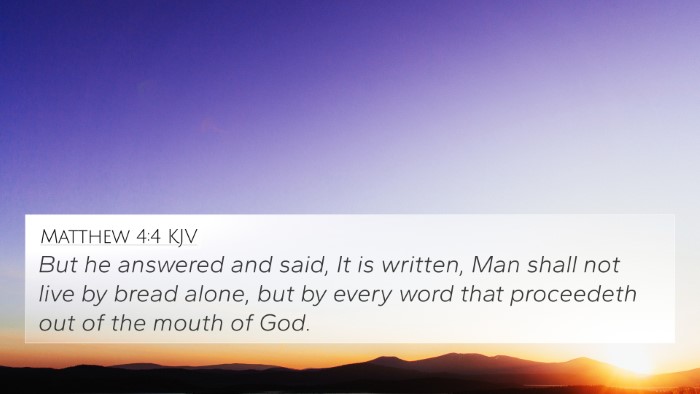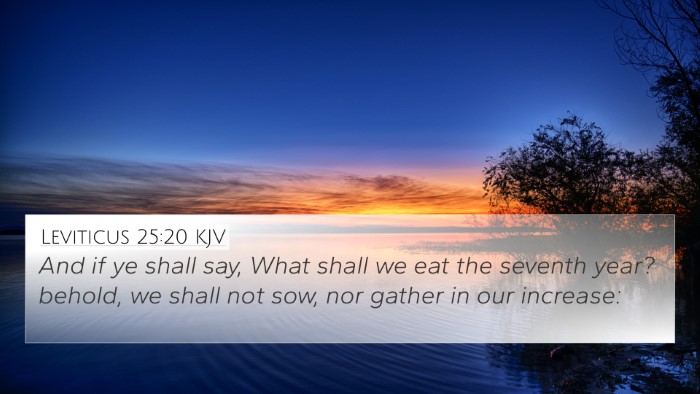Understanding Matthew 6:31
In Matthew 6:31, Jesus provides profound insight into human anxiety related to basic needs such as food and clothing. The verse states:
"Therefore do not be anxious, saying, 'What shall we eat?' or 'What shall we drink?' or 'What shall we wear?'
Context and Meaning
This verse is situated within the broader context of Jesus' Sermon on the Mount, where He addresses the theme of worry and trust in God. Matthew Henry highlights that Jesus encourages His followers to relinquish their fears about daily necessities, emphasizing reliance on God’s provision.
Albert Barnes expounds on this by noting that concern over such needs betrays a lack of faith in God's care and generosity. He points out that Jesus invites believers to seek the Kingdom of God first, which assures that their earthly needs will be provided.
Adam Clarke further explains that the repetition of various necessities serves to illustrate the comprehensive nature of human concern. He reminds believers that these concerns are often the result of focusing too heavily on temporal things rather than eternal truths.
Key Insights from Public Commentaries
-
Matthew Henry:
He emphasizes that anxiety over material needs distracts from spiritual priorities. By trusting in God, believers can experience peace that transcends their circumstances.
-
Albert Barnes:
He notes that the phrase 'What shall we eat?' reflects not just physical hunger but our tendency to obsess over future provisions, instead of trusting in God’s promises.
-
Adam Clarke:
His commentary relays that Jesus reassures us that our Heavenly Father knows our needs. Therefore, we should live with faith, rather than anxiety.
Bible Verse Cross-References
Matthew 6:31 connects with several other scripture passages, providing a richer understanding of its message:
- Philippians 4:19: "And my God will supply every need of yours according to his riches in glory in Christ Jesus."
- Luke 12:22-26: Jesus reiterates the same message, urging His followers not to worry about their lives, emphasizing God’s provision.
- 1 Peter 5:7: "Cast all your anxieties on him, because he cares for you."
- Psalm 37:25: "I have been young, and now am old, yet I have not seen the righteous forsaken or his children begging for bread."
- Matthew 6:33: This verse emphasizes seeking first the Kingdom of God and His righteousness, assuring that all these things will be added to you.
- Romans 8:32: "He who did not spare his own Son but gave him up for us all, how will he not also with him graciously give us all things?"
- John 14:1: "Let not your hearts be troubled. Believe in God; believe also in me."
Thematic Bible Verse Connections
The themes of reliance on God and the futility of anxiety recur throughout Scripture. The following verses can enhance the understanding of Matthew 6:31:
- Proverbs 3:5-6: "Trust in the Lord with all your heart, and do not lean on your own understanding."
- Isaiah 41:10: "Fear not, for I am with you; be not dismayed, for I am your God; I will strengthen you, I will help you."
Ways to Use Cross-References
When studying Bible verses like Matthew 6:31, employ tools such as a Bible concordance or cross-reference guide. Cross-referencing Bible texts allows for a comparative Bible verse analysis that reveals deeper insights.
Cross-Referencing Bible Study Methods
To incorporate these cross-references:
- Identify Themes: Extract the central theme of worry and trust in God, and connect with other verses that tackle similar themes.
- Contextual Linking: Study associated narratives to understand the overarching biblical message regarding God’s provision.
- Comparative Analysis: Compare Matthew 6:31 with related verses across both the Old and New Testaments.
Conclusion
Matthew 6:31 stands as a powerful reminder to believers to relinquish anxiety about their daily needs and to trust in God's providential care. By cross-referencing this verse with others, a comprehensive understanding of God's promises and faithfulness can emerge. Use this verse and its connections to deepen your faith and bolster your trust in God’s provision.











